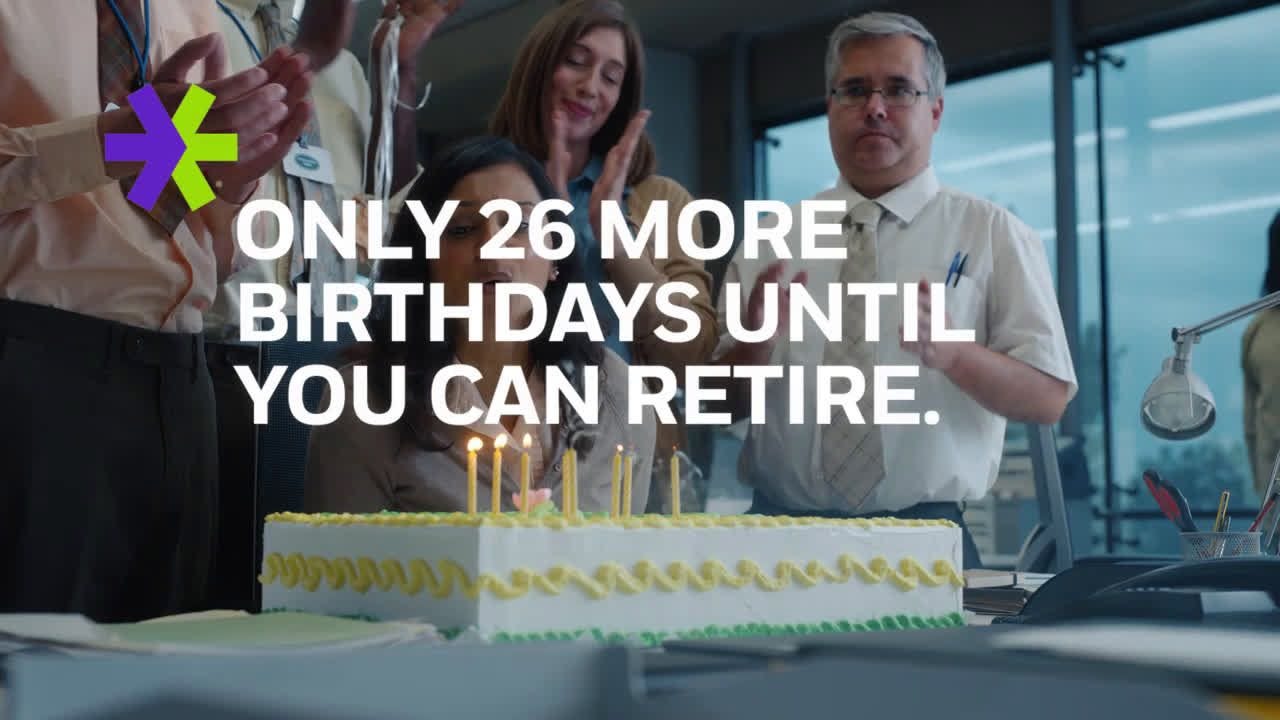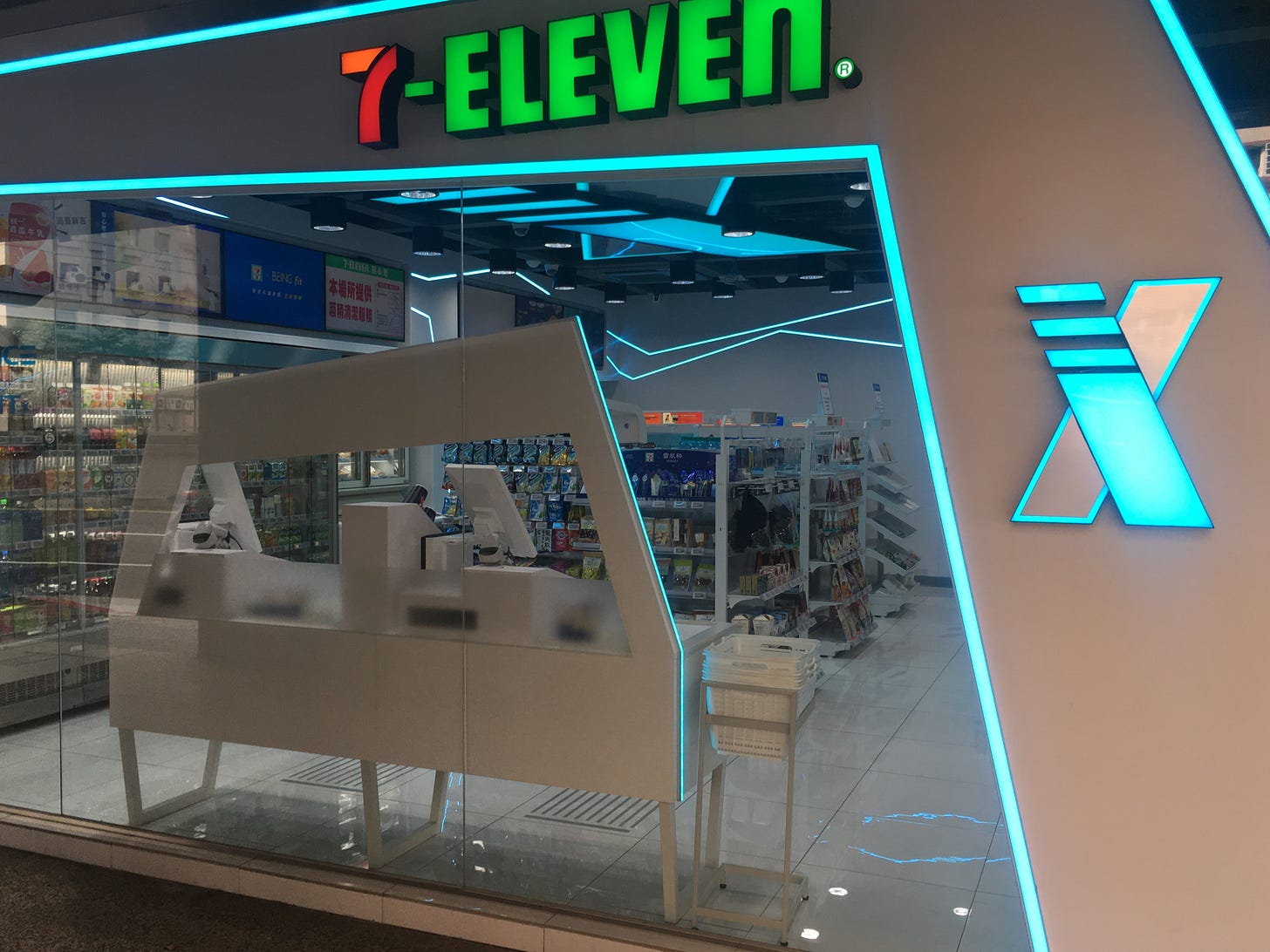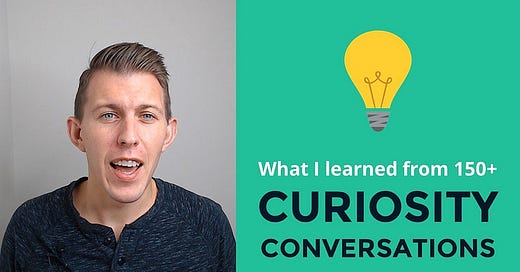#82: Curiosity Conversations, A Big Question, Prosperity, Coal Country & Wealth
😎 Reflections on life, work & what matters
February 15th: Greetings from Taiwan. I was off last week, but I’ve prepared an extra-long issue for your Saturday wherever you happen to be! Here’s a pic taken wandering around my apartment this week:

👋 Greetings to the many new followers this week as I just passed 1500 subscribers. I love hearing from you so say hi and let me know if you ever have feedback on what you read!
🙏 If you'd like to become a supporter, you can do so here or join the 21 other patrons on Patreon
📩 Share this newsletter via e-mail or twitter#1 Curiosity Conversations 💡
One of the most fun things I’ve done over the past few years is have 150+ “curiosity conversations” with people from around the world. Over the past couple of weeks I had a conversation with a PhD student in Wisconsin studying empathy and a self-employed financial adviser in New Zealand. They continue to be one of the most energizing and rewarding things I do and am thankful to many of the readers I’ve met throughout the world and more to come!
Why do I have these conversation?
After reading Brian Grazer’s “A Curious Mind” he talks about how he reached out to successful entertainment figures early in his career for no agenda curiosity conversations. He has continued doing this for decades expanding the practice outside of his industry.
My ideas - make it easy to connect
Many entrepreneurs talk about productivity hacks, automated e-mails and other ways to optimize your time so you can work on what makes money or has an impact on your business. For me, talking with people and learning from others, testing out ideas and making random connections is one of the most enjoyable things I do. Sometimes these conversations lead to project ideas, but most of the time I leave with a good feeling and maybe someone I’ll grab coffee with in the future.
I recorded a short video this week to share my approach and some of what I’ve learned.
#2 An Important Question 🤔
I wrote this short essay on LinkedIn this week and thought I’d share here. Let me know your results if you do the exercise!A large number of people have gone months, sometimes years. without asking basic questions to themselves about how they want to live life.
Recently, I was having a "curiosity conversation" with someone and I asked them "what kind of life do you want to live?" They responded that she had never thought to ask such a question.
This response is typical. Over the past few years I've had hundreds of conversations with people all around the world and many of those people also have never really explored the question.
It wasn't until I went through a health crisis in my late twenties that it dawned on me to ask that question and by ask that question, I mean really ask it.
Asking that question made me realize I wasn't on a path that I wanted to be on. I was following a script. Someone else's script. Asking the question forced me over several years to pave a path so I could leave my job and start a new chapter. It also led me across the world and it led me to getting married.
I don't have any deep answers, but I do wish more people would ask the basic, yet challenging questions.
What kind of life do you want to live?
It doesn't mean following someone else's cliche of "following your passion" or quitting your job to travel the world (though you can probably do it cheaper than you think). It means making room for time that you spend in a meaningful way.
It means dreaming a little bigger than you did yesterday.
It could be a life that includes a trip you always wanted to take with your parents, a meditation retreat you keep putting off, a sabbatical from work to start writing that novel, volunteering at your local school, or even just going on that hike that's only 30 minutes away but always seems to be put off for another day.
If the question of "what kind of life do you want to live?" is too much, I recommend a simpler exercise.
Write down on a paper 10 things you want to do in the next five years.
That's it. Pull out a pen and start writing.
After three or four it might get kind of hard. That's when you know you are starting to grapple with the question. It might also be easy and 10 is not enough. In that case, its probably time you start creating some space in your life to get going.
I'm a dreamer and an optimist. I've always been this way. Exploring different ways of living life has always energized me. When I was younger I thought I could convince others to just think like me, but now I'm a little bit smarter. I've gone through some challenges and know its not always easier to just go do something.
But if we don't even ask the questions, how do we even know what's possible?
#3 Redefining wealth & prosperity
23andme recently announced it was laying off 100 people. Given how our employment system is set up this is a bad thing for those 100 people. However, what if this is a good thing for the overall economy?
We tend to assume all growth is good, no matter what. Bigger is better. Growth gives us better things and helps to improve people’s lives.
But 23andme is not growing because you can’t sell a DNA test to people twice and many competitors are now offering essentially the same product. What if we didn’t look at this as a failure for the company, just a natural end point to a good business story. Our assumptions that more growth is always better and the fact that we tend to need that growth in the short term blind us from many things.
For one, the impact on our environment of all these products we keep coming up with.

One article claimed that since the 1950s, humans have created 18.2 billion pounds of plastic or the equivalent of “1 billion elephants”
Oshan Jarrow (who is also exploring many similar ideas here) shared an essay which offers a way out of this predicament. The essay argues that we need to redefine wealth and prosperity. It was a great optimistic read on how capitalism can be reformed by embracing new mental models for how we think about prosperity and wealth.
A lot of our ideas of growth are tied up in the GDP, which most economists admit is a terrible measure for our modern economy, yet it persists. What if we instead measured people’s lives:
What percentage of the population has access to good housing, transport, health care, entertainment, and so on?
…and that we might be better served for a more nuanced conversation about growth:
…there is too little debate about what it is all for. Hardly anyone ever asks: What kind of growth do we want? What does “wealth” mean? And what will it do for our lives?"
The essay also makes a convincing case that we’ve gone too far in the direction of glorifying wealth as the ultimate marker of success.
"today our culture celebrates money and wealth as the benchmarks of success. Imagine if instead we celebrated innovative solutions to human problems."
I think this is challenging because so many people, even people with a lot of money, seem to be gripped with financial insecurity. “What if I get sick?” “What if I don’t have enough?” Financial companies constantly remind us to be afraid:

I love the conception of capitalism as an evolutionary process of survival - one where good ideas emerge from many bad ideas:
"Capitalism’s great power in creating prosperity comes from the **evolutionary way** in which it encourages individuals to explore the almost infinite space of potential solutions to human problems, and then scale up and propagate ideas that work, and scale down or discard those that don’t.
Understanding prosperity as solutions, and capitalism as an evolutionary problem-solving system, clarifies why it is the most effective social technology ever devised for creating rising standards of living."
I see a lot of criticism about capitalism, but people seem to forget that capitalism also operates very differently in many places around the world where cultural beliefs are different. It may seem cliche but if we really want change, perhaps we should change the way we are orienting and making decisions in our own lives.
Instead of praising people for landing a job paying a lot of money above all else, we can also start asking each other is “how are you helping to create prosperity for others?”
👉 Check out the essay here
#4 Income & Wealth
A blog post from the federal reserve analyzed expected wealth and income for millennials. It seems that for people with degrees, income is higher than previous generations while wealth is lower. This is probably due to many factors including expensive housing and increased debt.
However, the real red flag is people without a college degree, who are struggling to build wealth similar to previous generations:

#5 Coal Country (h/t Jason Snyder)
This longform dive into “coal country” aka Appalachia was a sad read about the state of that area of the US. It dives into the detrimental impact of the region becoming dependent on one industry paired with political capture of the industry.
Based on how much politicians talks about coal, you’d thing it was a major employment sector, which turns out not to be true:
After peaking in 1940, at 140,000—around a third of the state’s workforce—there are now only around 11,600 working miners in West Virginia. (2% of the workforce)
It also dives into the devestating impact that many company towns had on many families and their ability to build wealth:
Since they were privately owned, the camps enabled mining companies to govern not only production, but services and all means of consumption too: retail, recreation, education, medical care, worship, you name it. Each town was its own mini-monopoly—a phenomenon embodied in the company store.
…
On payday, White’s grandpa filed with everyone else into the Eastern company store to pocket a little mound of scrip, most of which he’d hand right back to pay for pinto beans, potatoes, rent, coal for home-heating, and any replacement mining gear he needed. (Workers supplied their own.) “Mostly you spent all your money on pinto beans and hoped your fridge didn’t break,” says White. The scrip system worked because there were no other stores. “There was just nowhere else to go.”
#6 Future of Work?
Spotted this cashier-less store in Taipei.

Not as slick as the Amazon Go stores as this is really a move from paid cashiers to unpaid work on behalf of the consumer.
Still interesting to see these pop up in Asia as they don’t seem to have as strong a “everyone needs to earn a living” ethic as the West.
That’s all for this week. Have a good weekend!

Want to Support Boundless? All of the options here
👉 If you want to learn more about who I am or what I’m working on, find me here, say hi on twitter, or check out some of my longform writing. If you aren’t subscribed to the e-mail, join us here:




